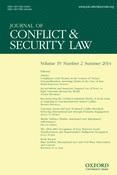Non-State Actors and Law of Armed Conflict Revisited: Enforcing International Law through Domestic Engagement
Anton Petrov – 2014
Compliance of non-State actors (NSA) constitutes a major problem of the law of armed conflict (LOAC). The reasons lie in the very structure of the law applying in non-international armed conflicts (NIAC). NSA feel disadvantaged and often do not recognize these State-made rules. A promising step is to engage NSA in some form of norm-setting. This can address the deficits of the current law of NIAC by creating a sense of ownership among NSA, and leading to a better-suited legal regime. It has been suggested to conduct this on an international level, and to grant NSA international law-making powers. This article points to significant potential downsides of such an approach. Instead, it argues, the same—or even better—results can be achieved by keeping the engagement on the domestic level and focusing on ad hoc regulation. From the outset, international law-making powers of NSA face major doctrinal difficulties. But also for practical reasons, ad hoc instruments are better suited to ensure a sense of ownership among NSA and to achieve tailored results for the specific conflict. Such domestic processes are also more sensitive to State concerns and interests making their participation more likely which, in turn, increases chances of successful implementation of an effective legal regime. Domestic and international approaches should not be seen as opposing, as they can often complement one another. This article seeks to contribute to the on-going discourse by highlighting some currently neglected aspects.

